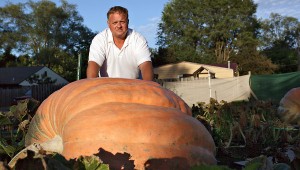I've said it before, but I'll say it again: In the US, we can make anything into a competition. The competitive activity de jour? Extreme gardening. Or, the race to grow the the one-ton pumpkin. These are not the kinds of pumpkins Charlie Brown and Linus saw in the pumpkin patch.
 In fact, you can't even eat these super-sized pumpkins (according to last week's New York Times story, their rinds are too thick and their sugar content too low).
In fact, you can't even eat these super-sized pumpkins (according to last week's New York Times story, their rinds are too thick and their sugar content too low).
 So what are these over-sized gourd-like fruits good for? Competing and winning. Men and women compete to grow the largest, intact pumpkin that they can. They are now turning to science to try to beat the odds, as the Times article highlights.
So what are these over-sized gourd-like fruits good for? Competing and winning. Men and women compete to grow the largest, intact pumpkin that they can. They are now turning to science to try to beat the odds, as the Times article highlights.
Others turn to more nefarious methods-- patch sabotage. In the 2007 PBS documentary, Lords of the Gourd, growers tell stories about competitors smashing their pumpkins or spraying them with weed killer. Some of these self-described extreme gardeners have installed video cameras in their fields to catch the culprits (human culprits, that is; they have traps and guns to stop four-legged culprits like mice and woodchucks). They have to fight against "pumpkin envy."
Lords of the Gourd is part of the excellent four-episode "The Pursuit of Excellence" documentary series produced by PBS. My favorite remains Ferrets, and I've written before about the synchronized swimming episode (the last in the series is about hair competitions). What The Pursuit of Excellence series highlights is how ordinary people get "addicted" to hobbies through competition. This is similar to language people use when explaining to me why they do child beauty pageants with their daughters-- use of terms like "getting sucked in" and addicted to winning like "it is a drug" is quite common.
Understanding competition as a form of addiction helps explain why people act the way they do in other competitive activities, like sports (where parents have physically attacked/murdered other parents, for example) and dance (one commenter wrote that he was horrified and shocked by the behavior shown on Dance Moms, when I wrote about it last week). The introduction of competition, whether for major prizes or just a ribbon and some public recognition, can make people behave in ways they would not normally act. When a very strict hierarchy and structure exists, without proper oversight and guidance by others with some experience and expertise, people can turn obsessive, nasty, and even criminal.
Thank goodness these pumpkin growers are working with their inanimate gourds, and not children.
Do you have a favorite competitive/extreme hobby?